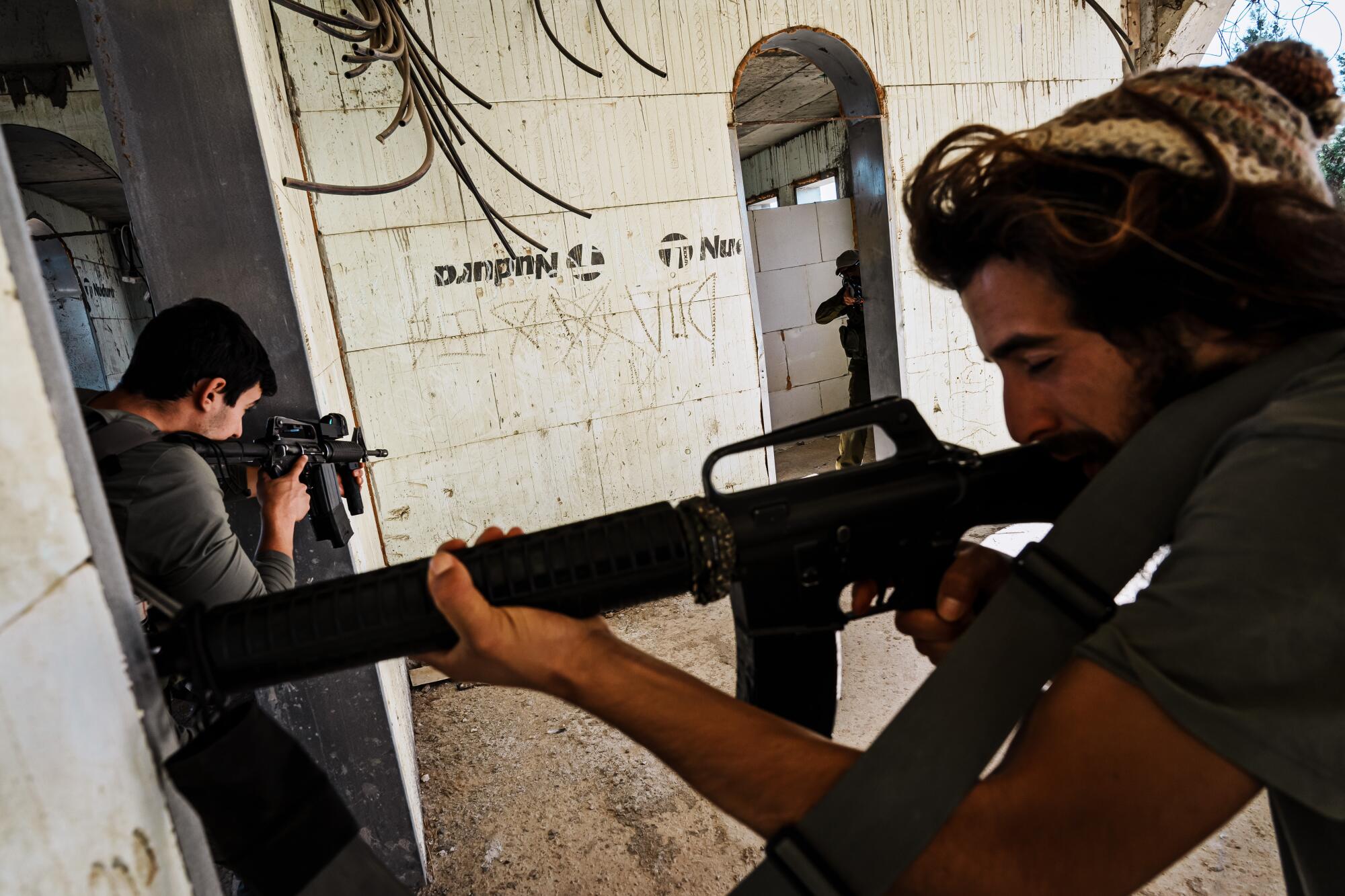
- Share via
HEBRON, West Bank — Tzvika Mor gripped his gun and spoke of how his son — kidnapped by Hamas and driven to the Gaza Strip more than a month ago — might have to die to show that Israel will never relent in the battle over this ancient land of olive groves, prophets and enmity.
Mor and his wife moved to the occupied West Bank as Jewish settlers nearly a quarter of a century ago, raising eight children, including Eitan, a security guard at a music festival who was among about 240 people taken hostage Oct. 7 when Hamas militants attacked Israel and killed at least 1,200. Mor said he would rather his son be executed by his captors than for his nation to cede any territory or give in to any demands by Hamas.
“This is our only land. We have no other,” said Mor, 47, a former paratrooper with a graying beard, who sat on a bench in the shadow of the Tomb of Abraham in this dangerously divided city 17 miles south of Jerusalem. “We have to be able to sacrifice our relatives. It is my oldest son, the first to call me dad. But we cannot be weak.”
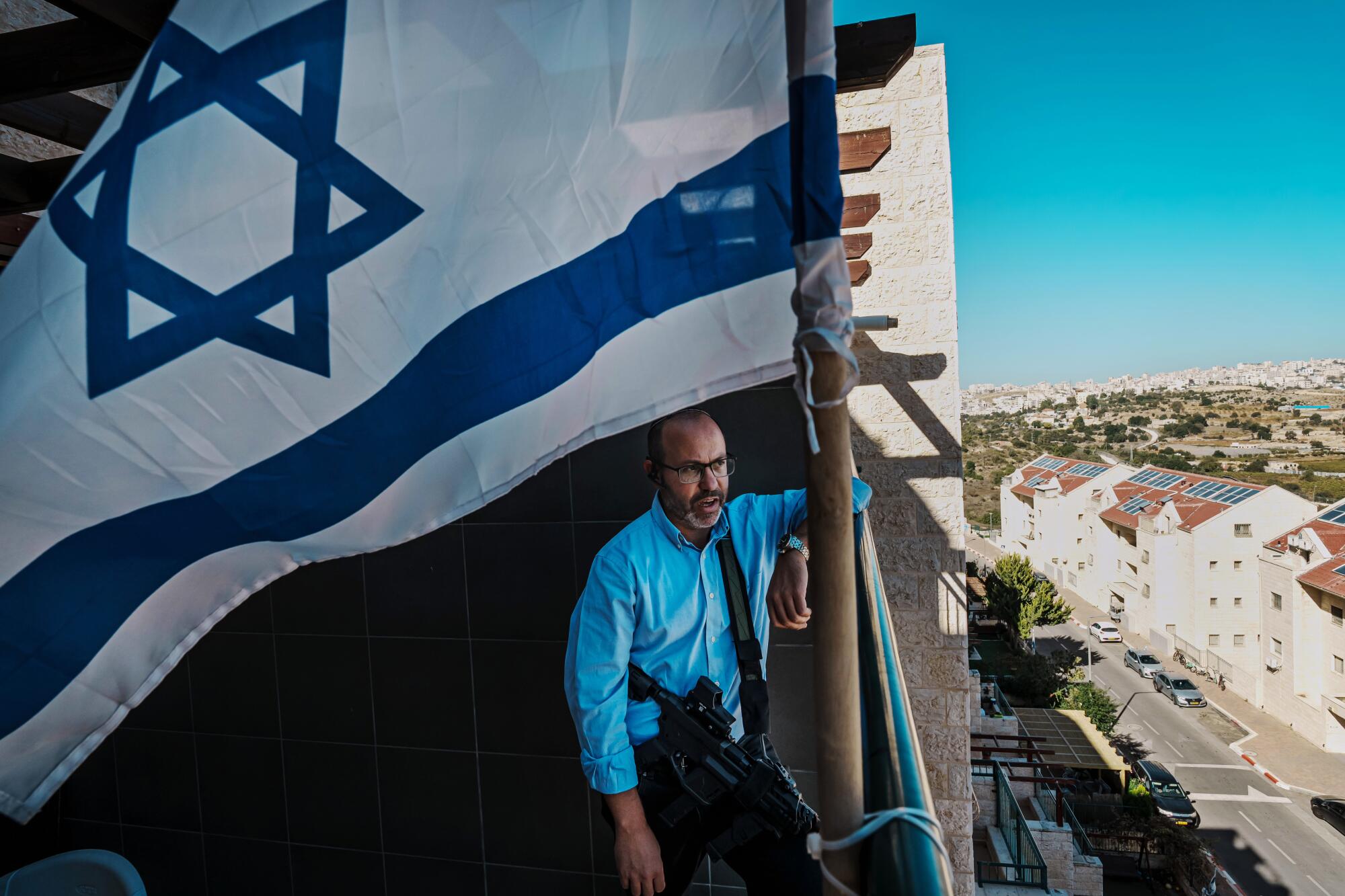
Mor’s is the pervading sentiment of many settlers, who believe this arid landscape west of the Jordan River, where the Muslim call to prayer mingles with the stun grenades of Israeli soldiers, was granted to them by God. Armed settlers man checkpoints and at times descend on Palestinian lands, disrupting the olive harvest and blocking villages in deadly provocations that have led to retaliatory knifings and ambush shootings by Palestinians.
The decades-long expansion of Jewish settlements in the West Bank has been condemned by the international community as a jigsaw-like strategy to prevent a contiguous Palestinian state in a region about the size of Delaware where about 500,000 Israelis — up from about 300,000 in 2010 — live in segregated enclaves among 2.7 million Palestinians. It is a perilous alchemy in a nation where aspects of life, including architecture and the designs of highways and villages, are orchestrated by the Israeli government in what human rights groups call an apartheid system that denies Palestinians the same rights as Israelis.
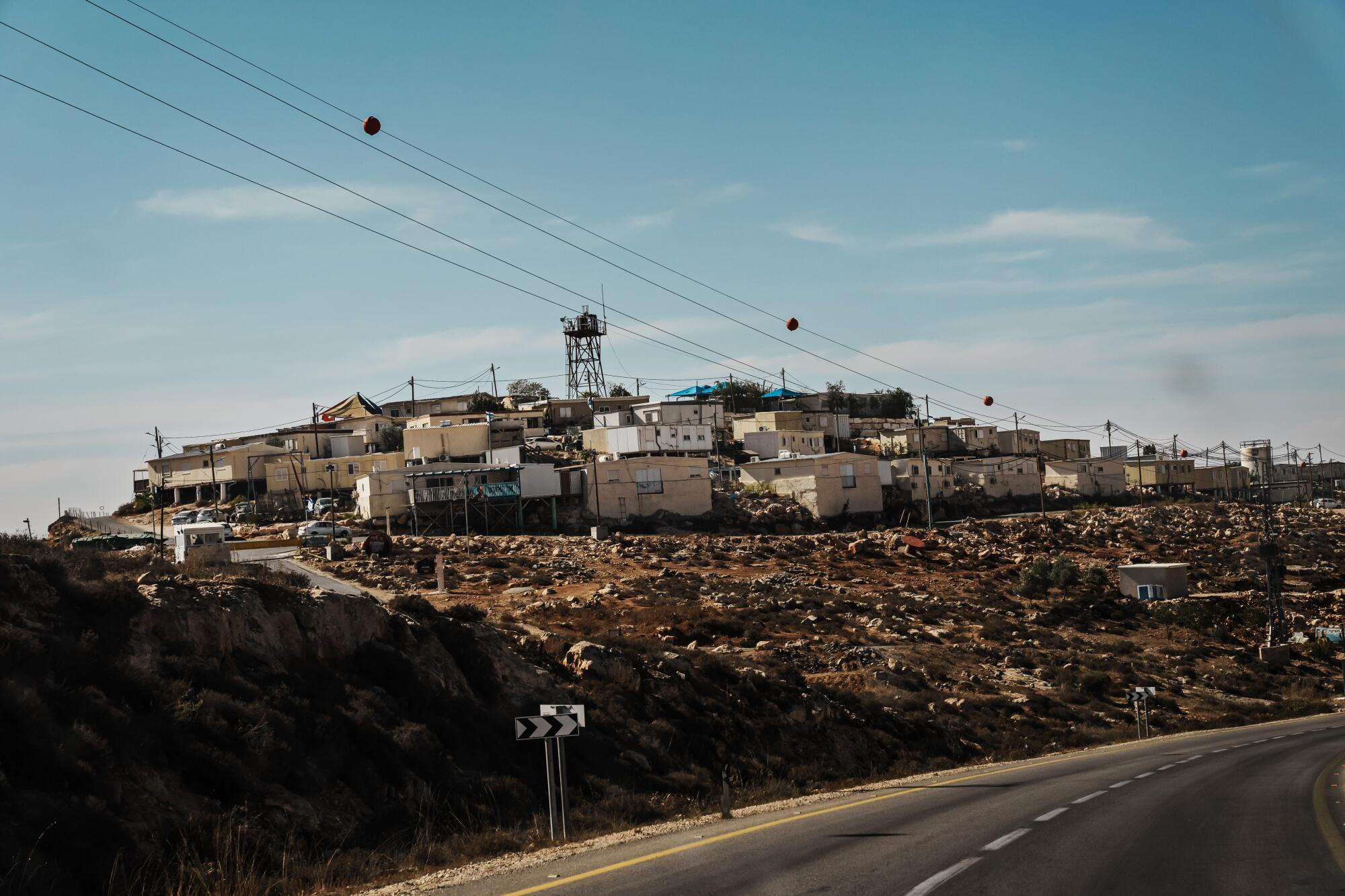
The Hamas attack in October has hardened the settler movement. As Israel’s war with Hamas in Gaza grinds on amid bombed buildings and the deaths of more than 11,000 Palestinians, according to the Hamas-run Health Ministry, violence in the West Bank is accelerating and threatens to open another front in the conflict.
That fervor has only intensified and become more bloody as the Israeli army has stepped up raids in the West Bank, occupied by Israel since its 1967 war with Arab nations, to search for Hamas militants. Eighteen Palestinians were killed in Jenin in recent days in airstrikes and gun battles between militants and Israeli soldiers. Over the last month, at least 167 Palestinians, including 45 children, in the West Bank have been killed by Israeli forces, according to the United Nations, which also reported that Jewish settlers have killed three Palestinians. Three Israelis have been killed in Palestinian attacks.
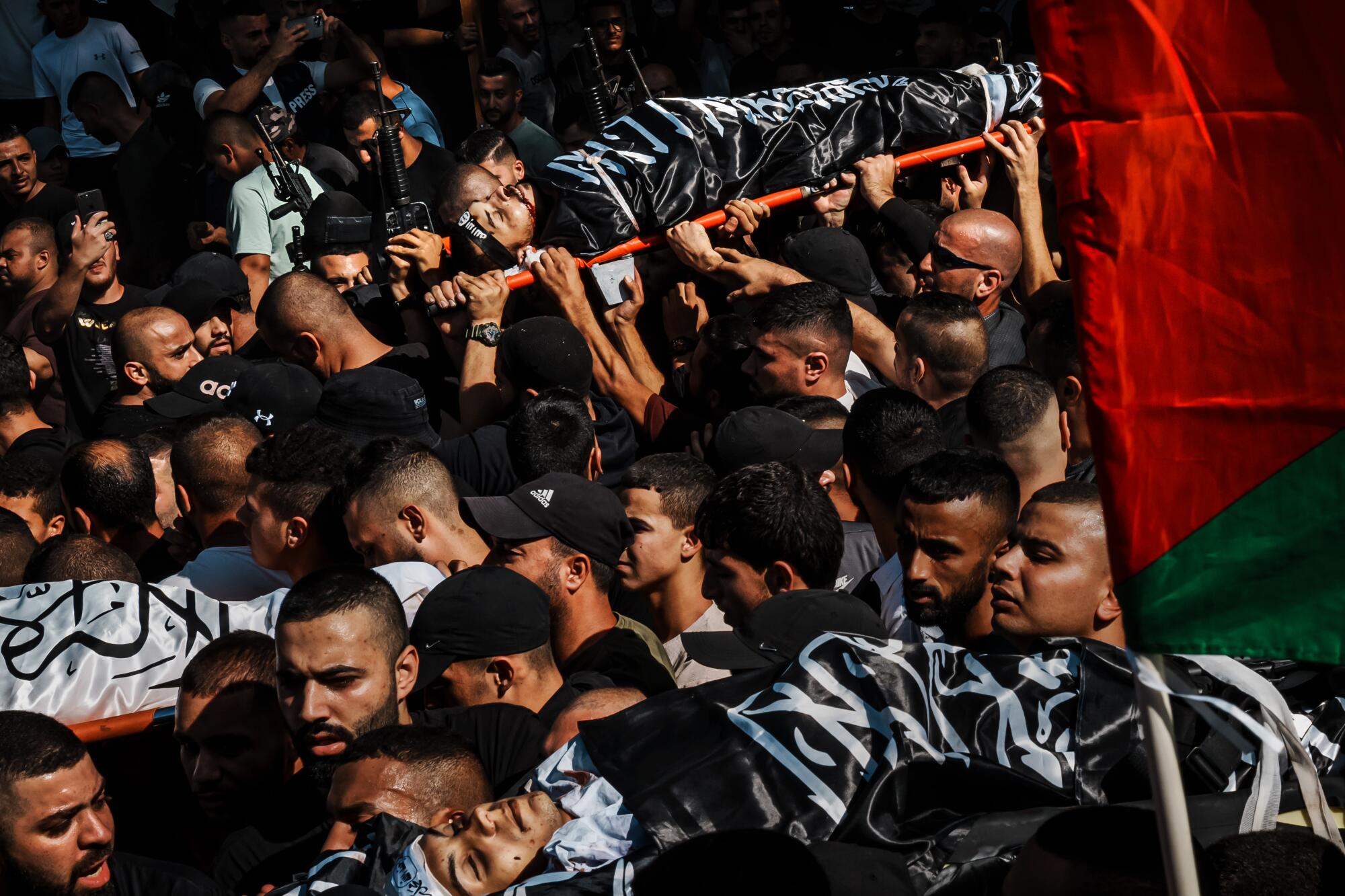
“I don’t want to carry this gun. I don’t want to go into a bomb shelter two times a day,” said Mor, who lives in the Kiryat Arba settlement neighboring Hebron. But, he added, the Palestinians “have to realize this land belongs to us.”
President Biden has urged the Israeli government to rein in radical settlers, saying they were “pouring gasoline” on a conflict that endangers the Middle East: “It has to stop,” he said in late October. “They have to be held accountable. It has to stop now.”
But the settlers, often with the tacit backing of Israeli soldiers, and sometimes dressed in military fatigues, are woven into the fabric of the country’s identity. Many of them are calling for Jewish settlements to return to Gaza if Hamas is defeated. Israel’s national security minister, Itamar Ben-Gvir, who speaks with biblical zeal of Jewish vigilance and has been convicted of racism charges against Arabs, has called for the arming of West Bank settlements. Applications for gun licenses in the settlement of Efrat have risen from about four a month to more than 1,000 since Oct. 7.
“Do not stop for a moment,” Ben-Gvir posted on social media. “Arming Israel — for the safety of us all.”
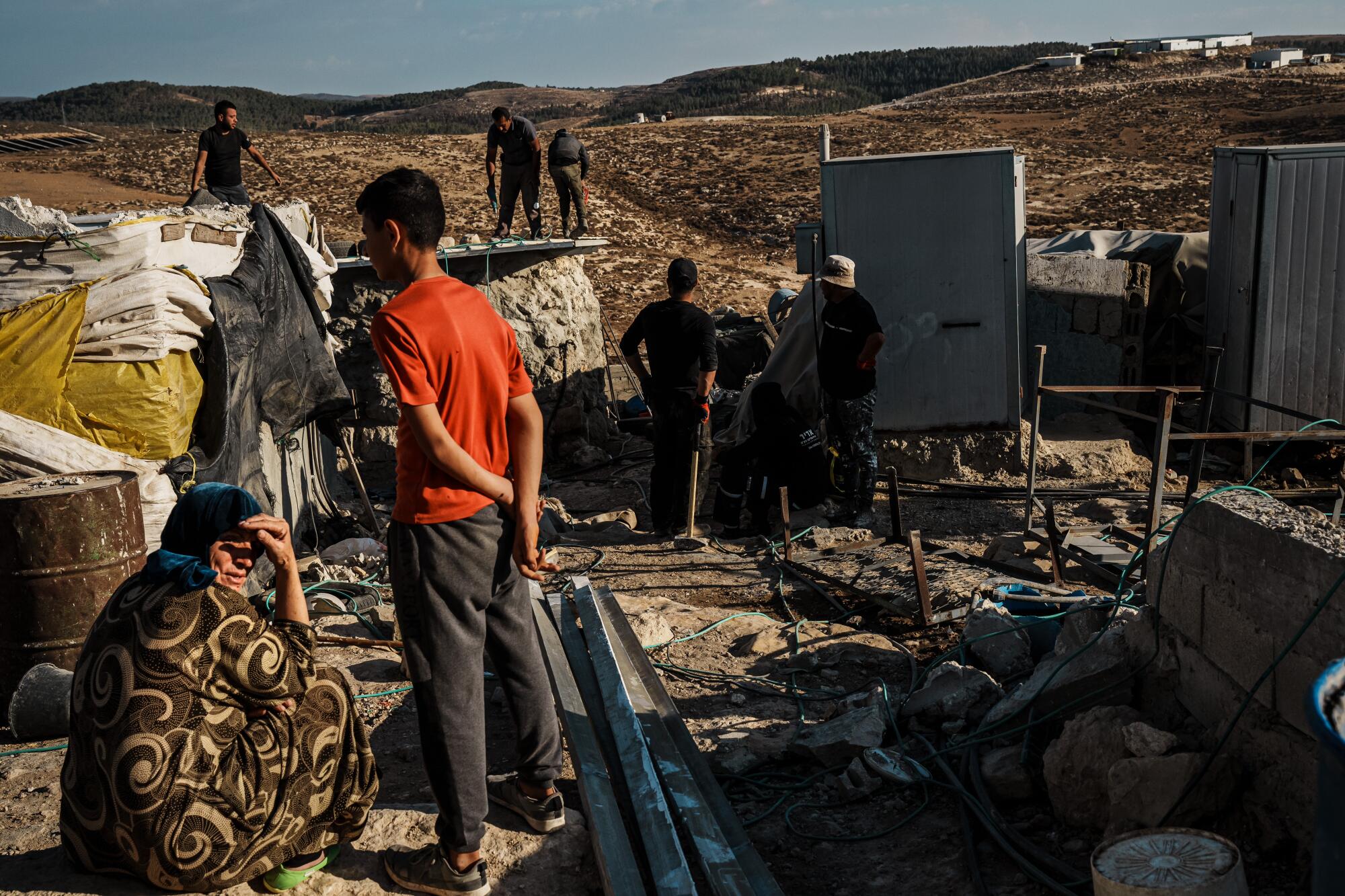
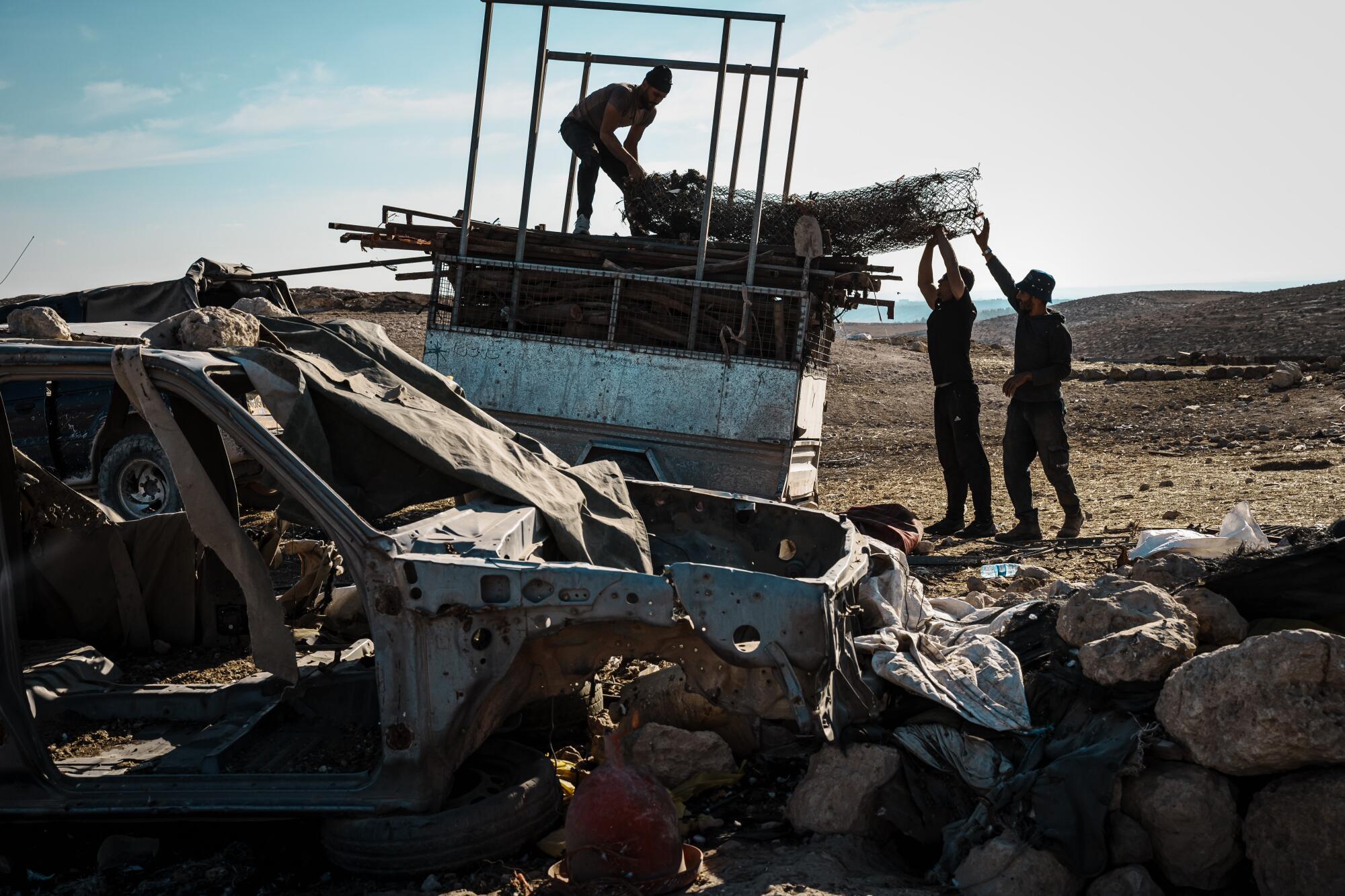
In recent weeks, nearly 1,000 Palestinians have fled small villages and farms, some of them packing up beds, sheep and even roofs to escape settler threats, according to B’Tselem, an Israeli human rights group. For some, it is reminiscent of the Nakba, or catastrophe, that unfolded amid the 1948 Arab-Israeli war when villages were taken over by Israelis and renamed as hundreds of thousands of Palestinians fled from their lands.
“They came to my home last night and beat me. Five men with masks on,” said Ahmed Jaber, a Palestinian living in Susiya, which is south of Hebron. “They pointed their guns at my daughters who are 7 and 9. They had a panic attack. The men told me to shut up when I tried to get them away from my children.” He added: “I have no intention of leaving. I don’t have anywhere else to go.”
The settler movement is a mix of nationalists, religious ideologues and those seeking new lives. Long established settlements, such as Efrat, have the feel of a well-to-do Southern California bedroom community. Their residents are less extreme than ones living in Kiryat Arba and others. But the aim is the same: Israeli domination. The rhetoric and style vary from vigilantes hunkered at illegal outposts to a more systematic and established air of control that includes trained security forces and working relationships with bordering Palestinian towns.
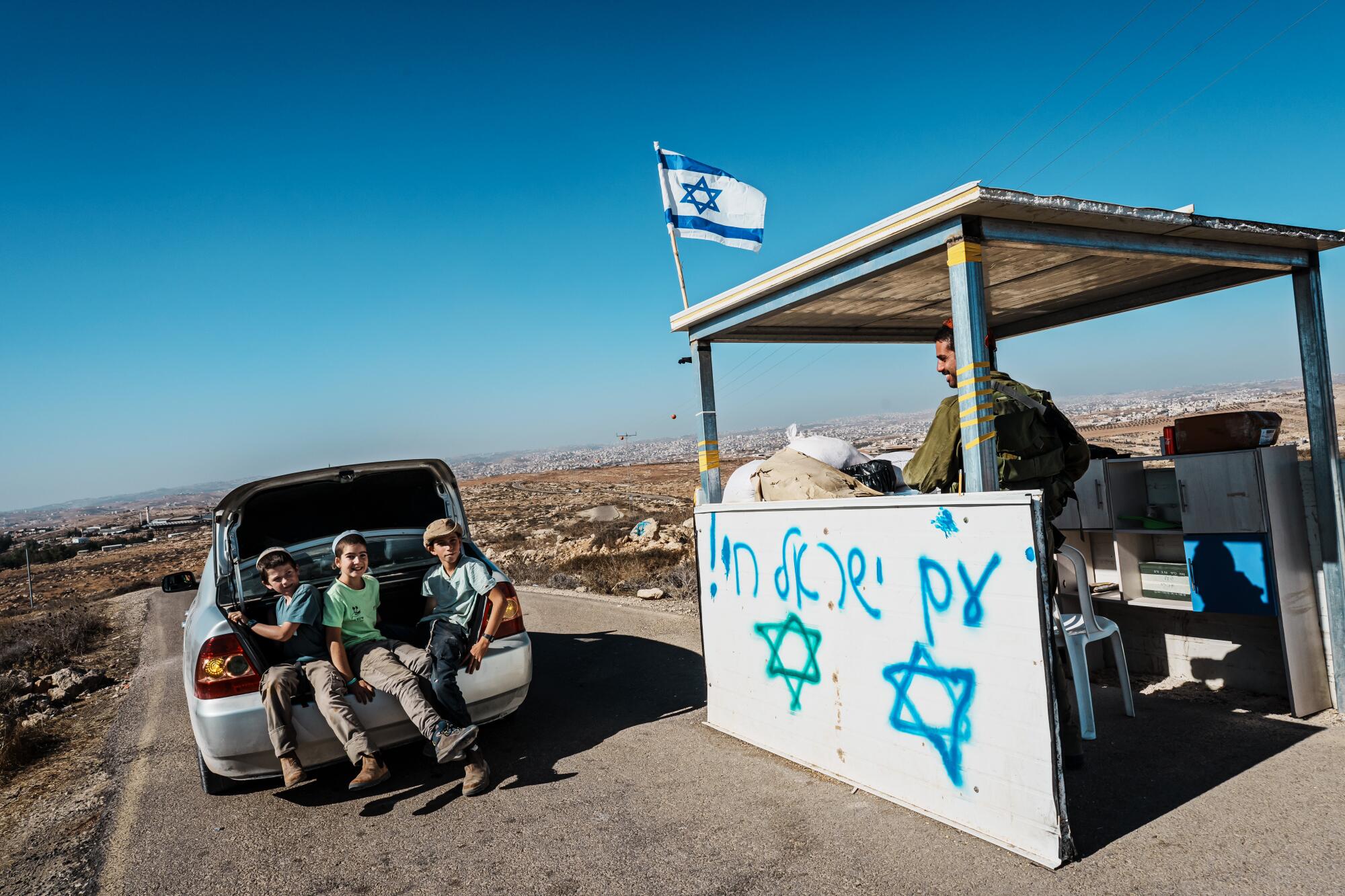
The settler movement embodies the radical right-wing government of Prime Minister Benjamin Netanyahu, who for years has relied on the courts, bureaucracy and the army to blunt any progress toward a two-state solution.
Oded Revivi, the mayor of Efrat, whose pistol pokes out from the back of his trousers, said Israel has endured a “vicious cycle” of violence since its forces pulled out of Gaza in 2005, which led to Hamas taking control of the territory.
“They chose Hamas in Gaza,” Revivi said of the Palestinians, who in the West Bank are governed by the Palestinian Authority, which is viewed as corrupt and ineffective by many Palestinians.
“We’re definitely afraid that what happened on Oct. 7 could happen here,” said the mayor, adding that his community of 15,000 settlers, which is bordered by Palestinian villages, has increased its police patrol cars fourfold to eight. Many Israelis in Efrat, he said, see “every Arab as a potential terrorist.”
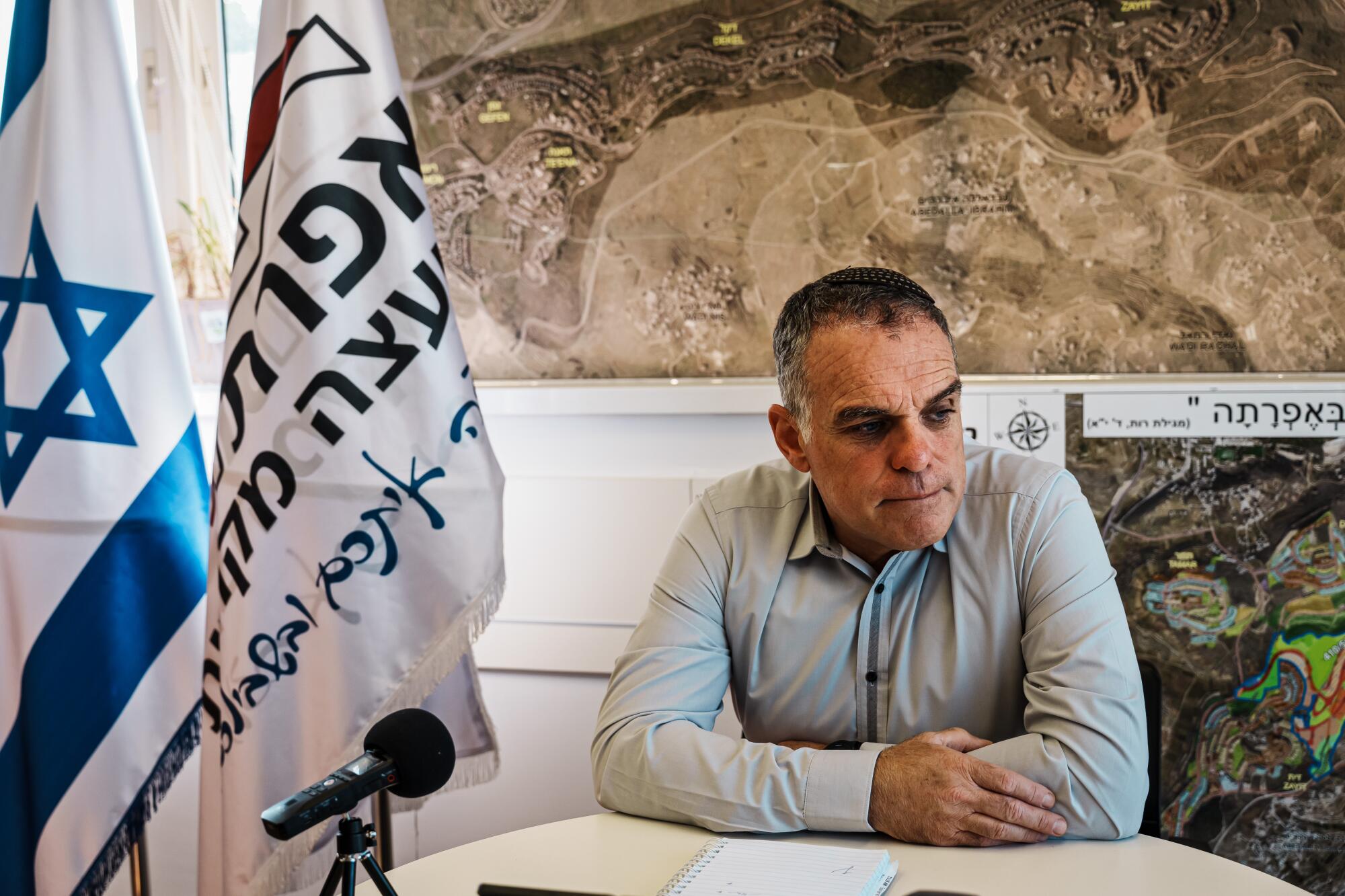
“Can we allow ourselves this vulnerability?” said Revivi, who, two days before the Hamas attack, invited Israeli officials along with 40 local Palestinians to his home for an annual gathering to ease tensions. “We need to find [a solution] that is new.”
South of Efrat toward Hebron, the landscape rolls with olive groves and Palestinian villages surrounding settlements. Minarets and concrete Israeli guard towers touch the sky. On a narrow street leading into Hebron, where about 700 settlers occupy an enclave in the historic center of a city of more than 200,000 Palestinians, Israeli soldiers fired stun grenades. A dog sidled through wisps of white smoke. The air quieted. The soldiers drove away. Such scenes are common — a fleeting provocation or perhaps something worse — and then life’s rhythms return amid the old stones and sequestered neighborhoods.
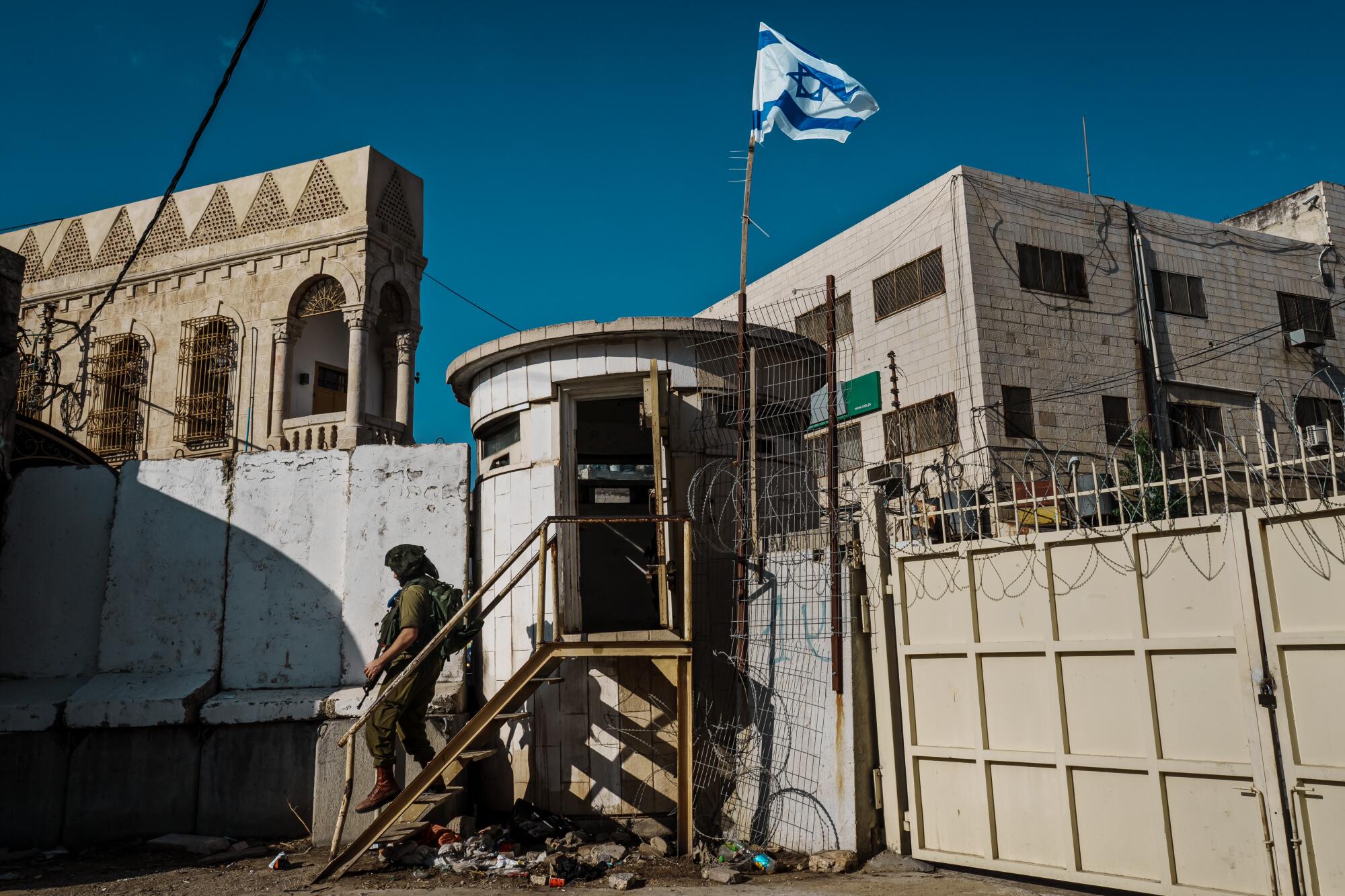
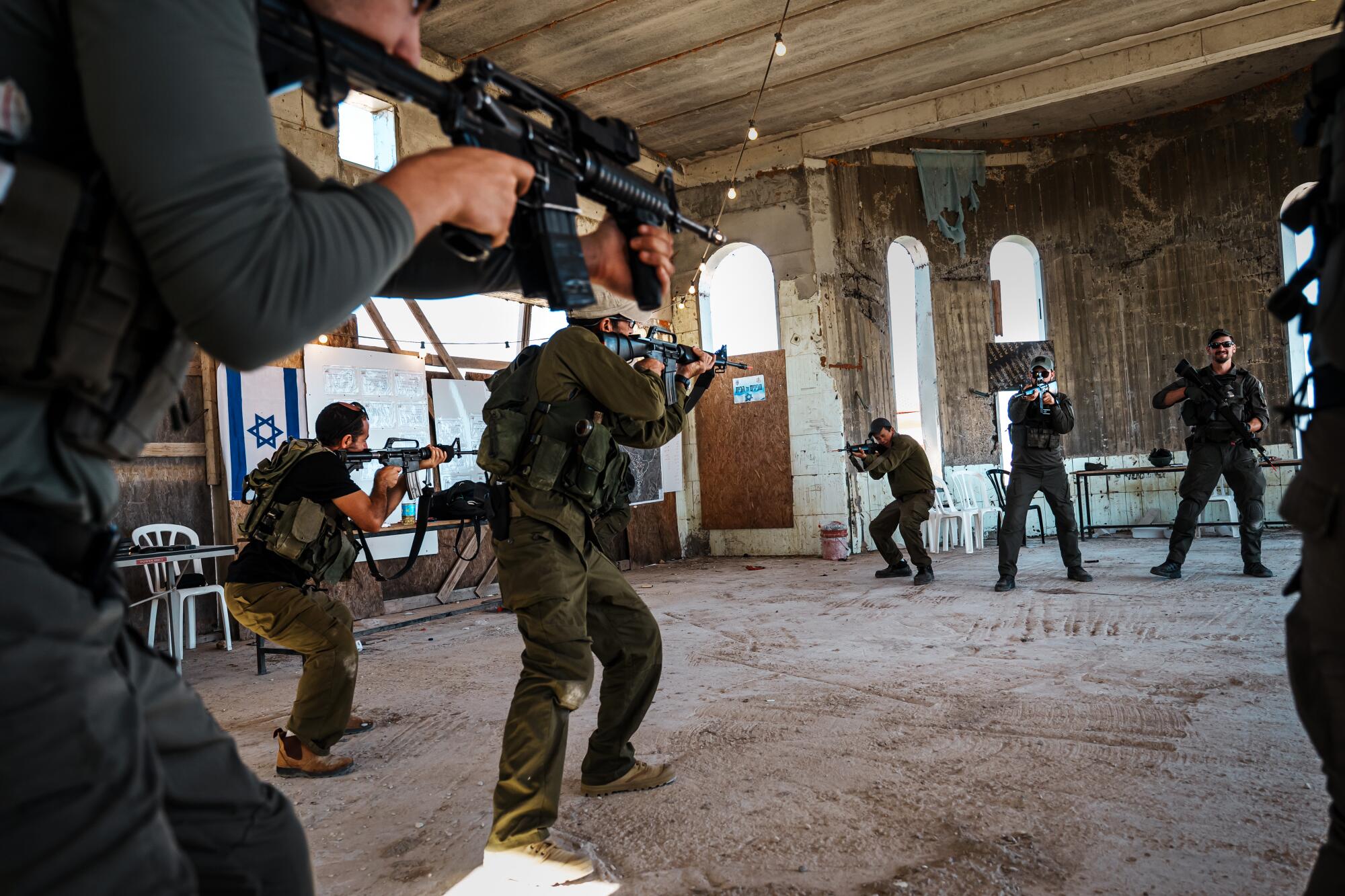
David Lev stepped past a man scrubbing the floor and a woman praying at the Tomb of Abraham. He comes here once a month and sometimes recounts Old Testament stories he’s known since childhood. The tomb’s architecture — Arabic calligraphy is carved above; holy books in Hebrew lie beneath — speaks to the history that Abraham was revered by both Muslims and Jews. Lev was in no mood to contemplate the sensitivities and nuances of a long and unsettled coexistence. He was angry. His nephew, an Israeli soldier, was killed Oct. 7.
“This is my home. I was given this home by God,” said Lev. “There is no such thing as a Palestinian people. There are Arabs who live here.” He spoke of revenge and punishment for the Hamas attacks and said that Jews were a “unique mutation,” a people whose religious and national identity were one. Unless the Arabs abide by the rules of Israel, he noted, they’ll have to leave, adding, in reference to Hamas, “the ideology of Islamic jihad is to conquer every soul they can.”
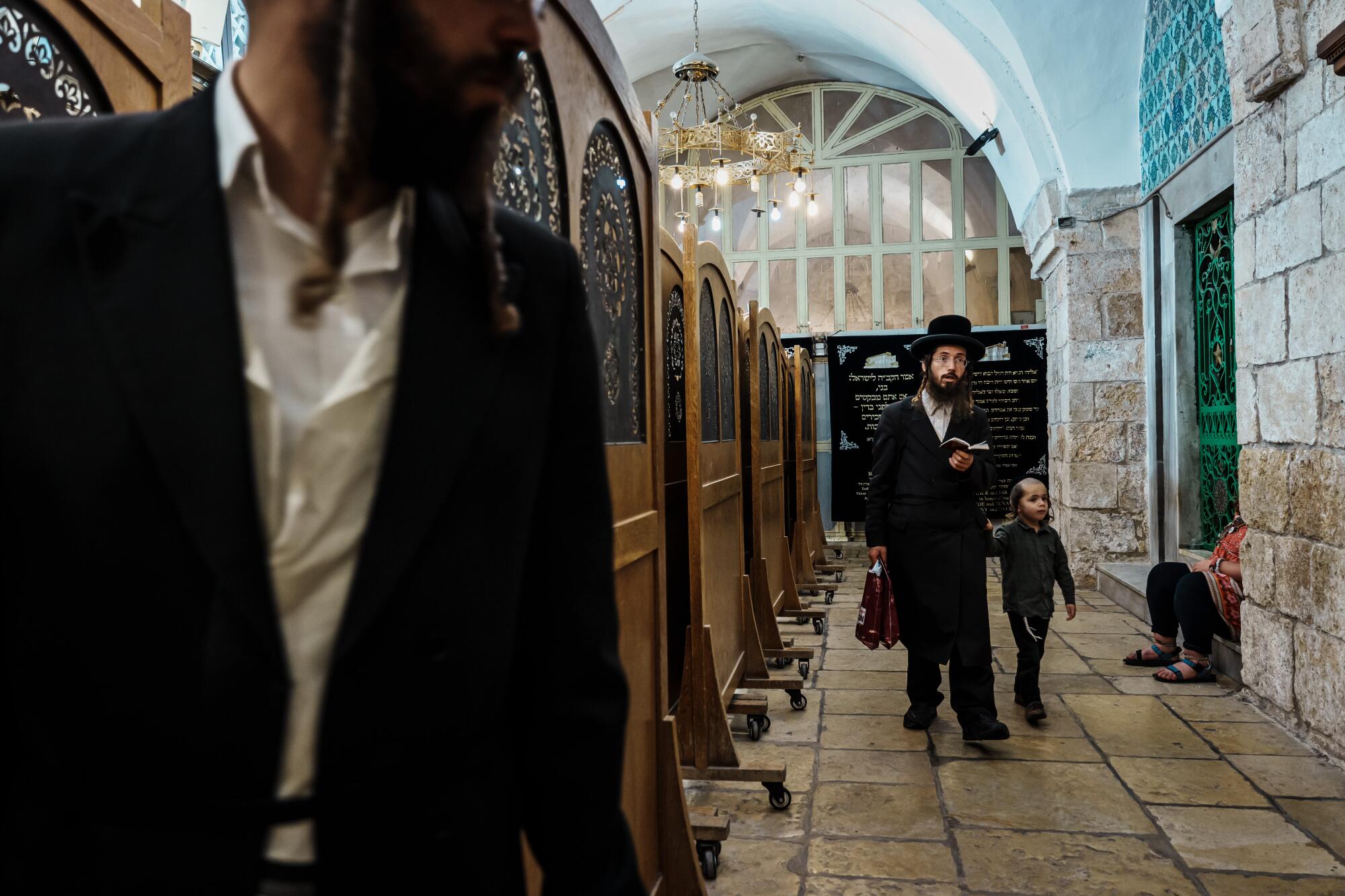
Lev left the tomb and walked down the steps into the courtyard, where six young men, all army reservists, waited with rifles in the shade. Another man, Dani Shukrun, whose family settled here from Europe after the 1967 war, spoke of the Holocaust and how the Hamas murder of Jews last month “goes back to the same story of Jews being slaughtered.”
Shukrun had driven to Hebron from Mitzpe Yair, a hilltop outpost overlooking the Judean Desert, where settlers in military uniforms train with rifles in an unfinished synagogue. He wore Ray-Bans; graying curls fell over his shoulders. He seemed more chilled hippie than militant settler. But he carried a rifle and a pistol, which fell from its holster and clattered over the stones. He said that Hamas must be destroyed, but that he could live with Palestinians who do not support violence.
“I’m a Jew threatened in my own country,” said Shukrun, who in calmer times works as a tour guide. He patted his weapon, resigned, like so many on both sides in this conflict, to the grievances and bloodshed that have beset generations since Israel’s war for independence in 1948.
Down the main street past the tomb, soldiers stood amid shuttered buildings and a metal gate that separated Jews from Palestinians. Cats lingered around a trash bin. Tear gas here is fired by remote control, but there was no sting in the air, although gunfire echoed for a moment in the hills.
Noam Arnon, a spokesman for Hebron’s Jewish community, sat in his study with the windows open. The Muslim call to prayer drifted in. He said that Palestinians should never be given their own state or Israeli citizenship, but that “peaceful Arabs” are welcome to live under an “Israeli umbrella.”
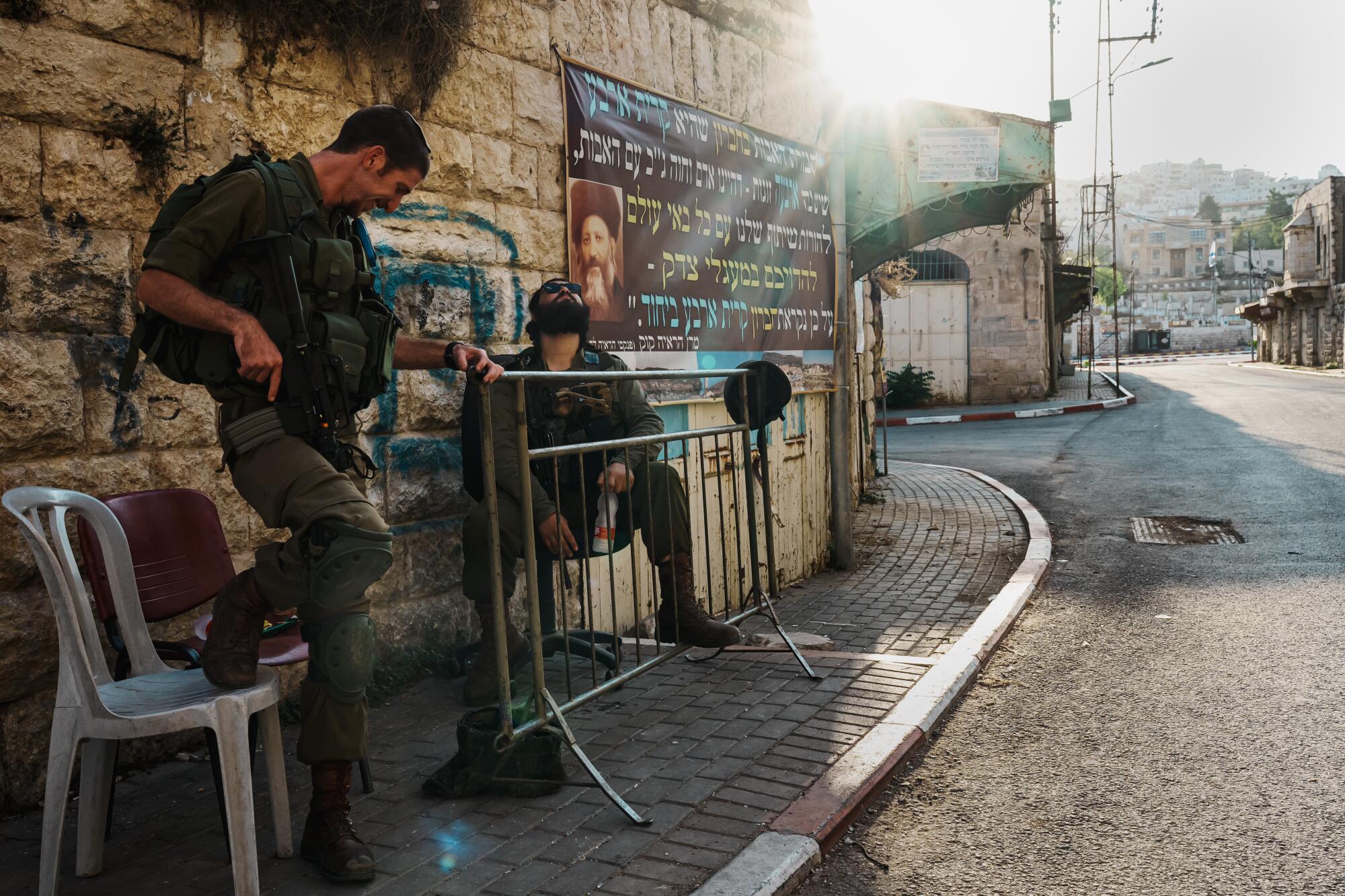
He opened a book on the 1929 massacre of Jews by Arabs in this city. He sees a cycle repeating itself, although he acknowledged that the grandfather of a Palestinian neighbor “did [help] save the lives of Jews” during that rampage. He suggested such assistance would not come today, adding that Israeli settlements should be expanded in the West Bank and returned to Gaza once Palestinians living there are expelled. “An historic tragedy” was made, he said, when Israel pulled out of Gaza and allowed Hamas to govern.
It was nearly dusk when Tzvika Mor arrived at the tomb for prayers. He said his son was kidnapped when militants overran a music festival and murdered an estimated 260 people. He doesn’t know if his eldest boy is dead or alive.
He looked up to the high, ancient walls over the tomb and the Cave of the Patriarchs, known to Muslims as the Ibrahimi Mosque, where Baruch Goldstein, an Israeli American, murdered 29 Palestinians in 1994. A dedication on his grave reads that he “gave his soul for the people of Israel, the Torah and his country.”
Mor spoke of a long-ago Jewish king and said with a father’s confidence that the Israeli army knows where “to bomb and where not to bomb” to bring the kidnapped home.
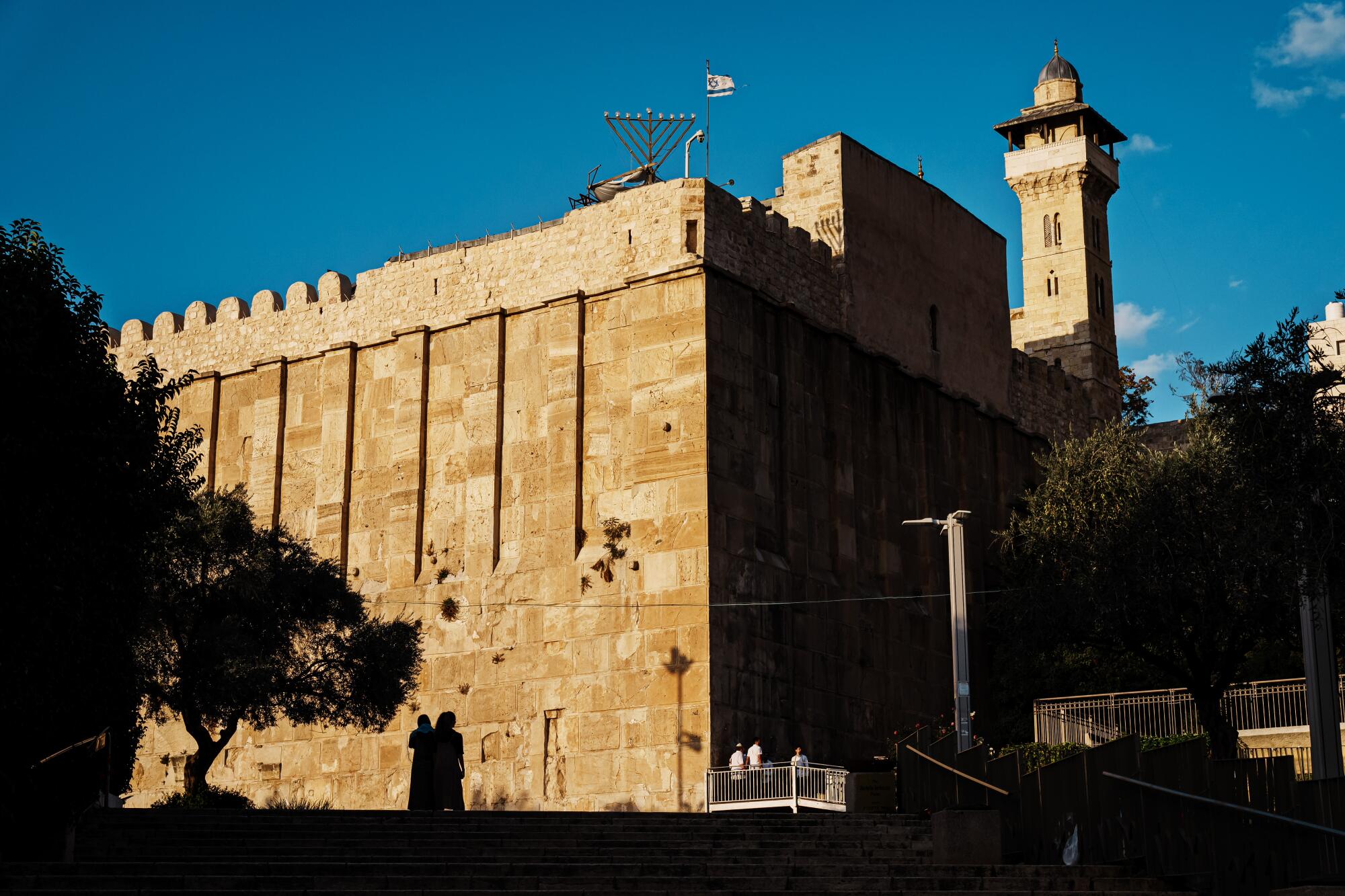
Mor spends his time these days talking to students. He tells them they are in a religious war.
“There’s no place for the weak,” he said, “only those willing to give up their lives.” He stresses that his son would rather die than have Israel negotiate an exchange of Hamas prisoners for Israeli hostages.
The students listen to him and applaud; they are used to men who speak in such ways with guns slung over their shoulders. “National pride and God will protect us,” he tells them.
Mor and his wife moved to Kiryat Arba from Tel Aviv in 1999 as Jewish settlements were expanding and the Oslo peace accords between Israelis and Palestinians were fraying. “We wanted to do something important for the state of Israel,” he said as a breeze lifted.
His family endured intifadas and bombings. He believes there is little chance for Israelis and Palestinians to live together: His plan is to divide the population of Gaza “into 20 portions” and send them to live in Arab countries.
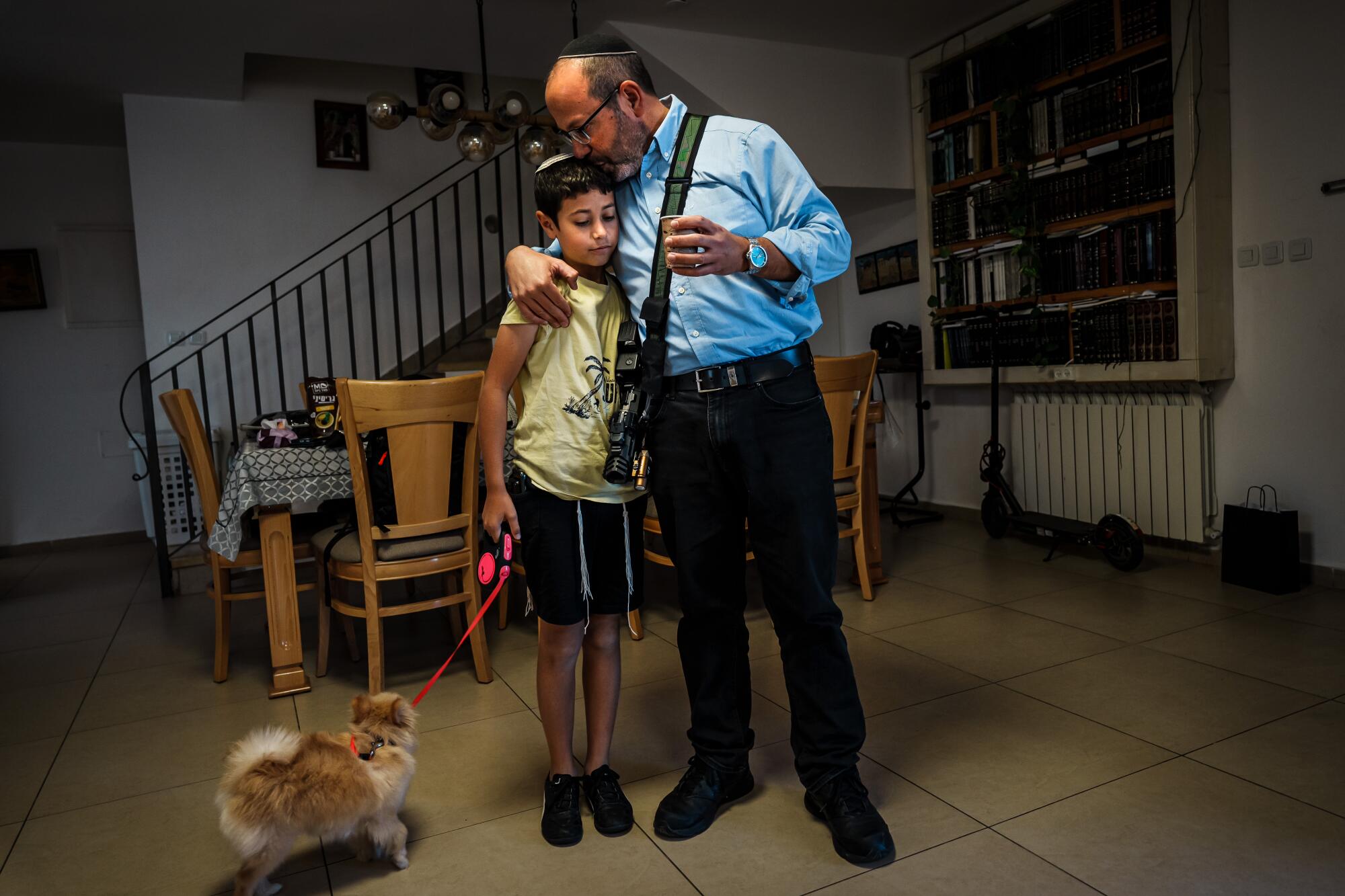
“We can’t allow our enemies to be too close to us anymore,” he said.
He lifted his gun and headed off to pray. Not far away, beyond an Israeli checkpoint, a Palestinian family kept the children close as night fell across the olive groves.
Times foreign correspondent and photographer Marcus Yam contributed to this report.
More to Read
Sign up for Essential California
The most important California stories and recommendations in your inbox every morning.
You may occasionally receive promotional content from the Los Angeles Times.












